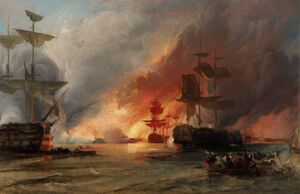Bashriyyan-Inyurstan Barbary War
This article is incomplete because it is pending further input from participants, or it is a work-in-progress by one author. Please comment on this article's talk page to share your input, comments and questions. Note: To contribute to this article, you may need to seek help from the author(s) of this page. |
| Bashriyyan-Inyurstan Barbary War | |||||||
|---|---|---|---|---|---|---|---|
| |||||||
| Belligerents | |||||||
|
| Bashriyya | ||||||
| Commanders and leaders | |||||||
|
| N/A | ||||||
| Strength | |||||||
|
(ships) |
(ships) | ||||||
| Casualties and losses | |||||||
|
|
Lolloh | ||||||
The barbary wars
Background
Able-bodied men, especially captured bodyguards, sailors or even a few unlike marines, were often pressed into service and forced to operate in "penal battalions" or "slave labor battalions" where they would be forced to carry extra supplies, dig trenches, set up camp, etc. Often times in combat, primarily in the Bashriyyan-Afruikahn Colonial Incursions but also in separate barbary wars with other coastal powers, they would be used as disposable "arrow fodder" to suck up the opening barrages of enemy forces (usually spears & arrows used by local Afruikahn warlords).
First Inyurstan Campaign
Operation Augillo Blanc
Battle of Tripoli Bay
Biron's Retreat
Second Inyurstan Campaign
With Biron's detachment regrouping off the coast of Bolreig, they were soon joined by Enriqué D'Andalucia arriving from Inyursta with fresh ships.
Battle of Halij Haraq
In order to strike at the Bashriyyan Sultan, the Inyurstan commanders deduced they would first have to destroy his navy. Given the ability of shore-borne artillery and excess locations to launch "suicide rafts", engaging them close to shore was considered too risky, and it was decided that the Bashriyyans should be engaged in open water.
Baiting Al-Monharaf
Fortunately, the Inyurstan retreat had left the Bashriyyan navy and barbary pirates alike believing they had effectively won the conflict and asserted their right to take ships and hostages. Playing further into the Inyurstan hands was that much of D'Andulcia's reinforcement fleet was comprised of former merchant vessels purchased or pressed into service after the conclusion of the Polaches-Juarez War, which allowed a group of three ships to effectively disguise themselves as a civilian merchant convoy.

